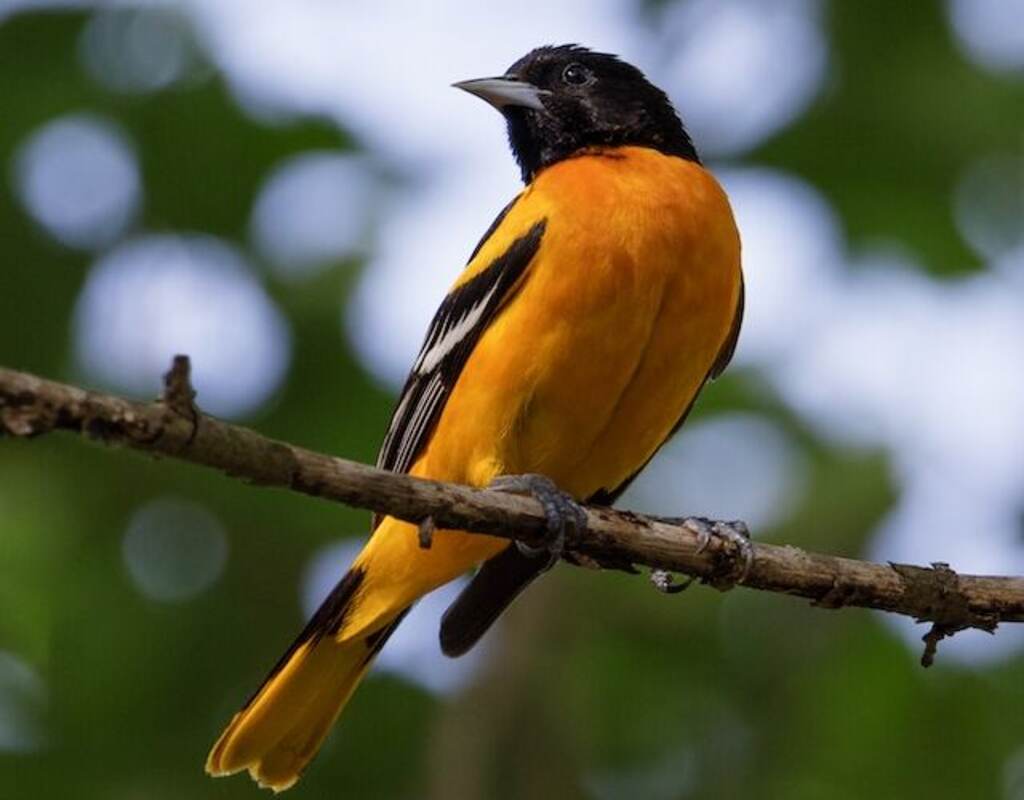Baltimore Orioles are a beautiful and delightful bird species that are commonly found in the eastern parts of North America. These birds are known for their bright orange plumage and sweet, melodious songs.
As migratory birds, they spend their breeding season in North America before migrating south to Central America during the winter months. As far as their diet is concerned, Baltimore Orioles mainly feed on nectar, fruit, and insects.
They have a unique feeding style where they use their brushy tongue to extract nectar from flowers or fruits. Their diet primarily consists of high-energy food sources that provide them with the necessary nutrients to sustain themselves during migration.
Table of Contents
- 1 Brief Overview of Baltimore Orioles and Their Diet
- 2 Question: Do Baltimore Orioles Eat Bird Seed?
- 3 Baltimore Orioles Diet
- 4 Bird Seed as a Food Option for Baltimore Orioles
- 5 Factors That May Influence Whether Baltimore Orioles Eat Bird Seed
- 6 Tips for Attracting Baltimore Orioles to Your Yard
- 7 Conclusion
- 8 FAQs: Do Baltimore Orioles Eat Bird Seed?
- 8.1 Do Baltimore Orioles eat bird seed?
- 8.2 What kind of seed do Baltimore Orioles like?
- 8.3 Does offering birdseed attract orioles?
- 8.4 Can Baltimore Orioles eat dried fruit?
- 8.5 What should I do if I want to attract Baltimore Orioles to my backyard?
- 8.6 Are Baltimore Orioles migratory birds?
- 8.7 What other types of food do Baltimore Orioles eat?
- 8.8 Are orioles attracted to hummingbird feeders?
- 8.9 How often should I change the birdseed in my oriole feeder?
- 8.10 What types of oriole feeders are available?
- 9 Author
Brief Overview of Baltimore Orioles and Their Diet
In addition to nectar, fruit, and insects, Baltimore Orioles also consume other foods such as jelly and suet during certain times of the year when these food sources are available.
They have a particular liking for ripe oranges that can be sliced into halves or hung up in bird feeders specifically designed for them.
Despite being primarily insectivorous birds, these gorgeous creatures have adapted over time to take advantage of available food sources around them.
However, it’s essential to note that Baltimore Orioles’ diet mainly consists of natural food options like fruits and insects.
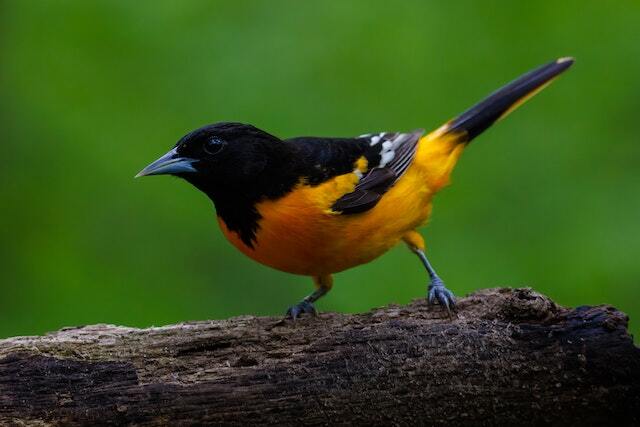
Question: Do Baltimore Orioles Eat Bird Seed?
One common question asked by bird enthusiasts is whether Baltimore Orioles eat bird seed. While there is no straightforward answer to this question, it is unlikely that they will feed on bird seed as their primary food source, since it does not form part of their natural diet.
Bird seed typically contains grains like millet or corn – which do not play a significant role in providing nutrition for tropical birds like Baltimore Orioles – unlike black oil sunflower seeds which can be suitable for them.
In the next sections, we will explore why birdseed may not be a natural food option for Baltimore Orioles, and discuss the factors that may influence whether they eat birdseed.
Additionally, we will provide tips on how you can attract Baltimore Orioles to your yard by offering them their preferred food options.
Baltimore Orioles Diet
Baltimore Orioles are known for their bright orange plumage and sweet, melodic songs. These birds are native to North America and can be found in a variety of habitats, from woodlands to suburban gardens.
Baltimore Orioles are primarily nectar feeders, meaning they obtain most of their energy from drinking the sweet nectar produced by flowers. They also eat a variety of other foods including fruits and insects.
Their Typical Diet
Nectar is the primary food source for Baltimore Orioles during the breeding season, which lasts from May to early August.
During this time, these birds will rely heavily on flowers such as trumpet creeper, jewelweed, and cardinal flower. They may also visit sugar water feeders that are specifically designed for them.
Outside the breeding season, Baltimore Orioles’ diets shift towards more fruit-based foods.
Fruit such as oranges, grape jelly or banana slices can be offered in a special feeder that is designed to hold these types of foods.
Insects also play an important role in Baltimore Orioles’ diets.
They will eat different types of insects, including caterpillars and beetles, which provide valuable protein and nutrients that they need throughout their lives.
Other Foods
Baltimore Orioles may occasionally eat other types of food when their preferred diet items are not available or when they need additional nutrients during tough seasons like winter or migration periods.
These birds may consume small amounts of suet (a type of high-fat bird food) at backyard feeders if it is available.
However, it is important to note that suet is not a natural part of their diet.
Nectar from flowers is the primary food source for Baltimore Orioles during the breeding season, while fruit becomes more important in late summer through fall migration.
Insects are an important source of protein and nutrients throughout the year. While Baltimore Orioles may occasionally eat other foods, their diets primarily consist of nectar, fruit and insects.
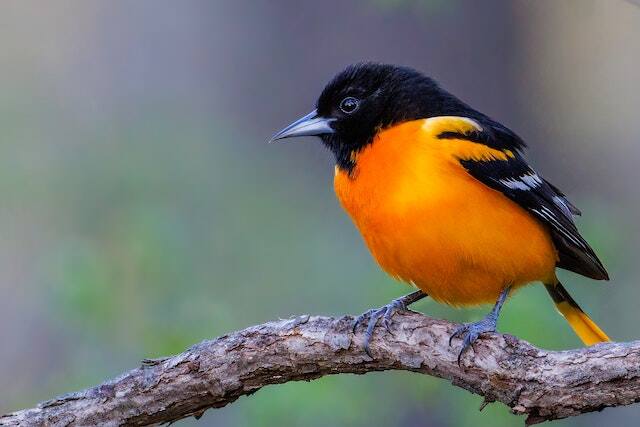
Bird Seed as a Food Option for Baltimore Orioles
Baltimore Orioles are primarily known to feed on nectar, insects, and fruits. While they may occasionally consume other foods like jelly and mealworms, bird seed is not a natural food option for them.
In fact, offering the wrong type of bird seed can be harmful to their health. Here we will discuss why birdseed is not the ideal food for Baltimore Orioles and which types of bird seed are suitable for them.
Explanation on why bird seed may not be a natural food option for Baltimore Orioles
Baltimore Orioles have long bills that are perfectly adapted to extract nectar from flowers and fruit juices from soft-skinned fruits like oranges. They have also been known to feed on insects like caterpillars, spiders, beetles, and ants.
While these foods provide the necessary nutrients needed by Baltimore Orioles throughout their life cycle, birds that feed on seeds have short and strong beaks that can crush hard shells of seeds.
Furthermore, most birds that feed on seeds have crops in their digestive system, where they store undigested seeds until they can be further broken down in the gizzard.
However, this adaptation is absent in Baltimore Orioles because they do not feed on hard-shelled seeds.
Instead of storing undigested material in a crop after eating it, Baltimore Oriole’s digestive system quickly processes the food.
Discussion on the type of bird seed that may be suitable for them (black oil sunflower seeds)
If you want to offer some form of birdseed to attract Baltimore Orioles into your yard or garden space, then black oil sunflower seeds are recommended because they contain high levels of protein and fat content, which provides energy needed by these birds during migration season.
In addition to black oil sunflower seeds, you can also offer other types of seed mixes that contain hulled sunflower seeds, safflower seeds, and nyjer seeds.
Ensure you purchase high-quality birdseed to avoid birds ingesting toxins from the contaminated food.
To conclude, while Baltimore Orioles may occasionally eat birdseed as a supplementary food source, it is not a natural or recommended food option for them. Their primary diet consists of nectar, fruit, and insects.
However, if you want to attract them to your yard or garden space, offering black oil sunflower and other quality seed mixes in a feeder may bring more Orioles into view.
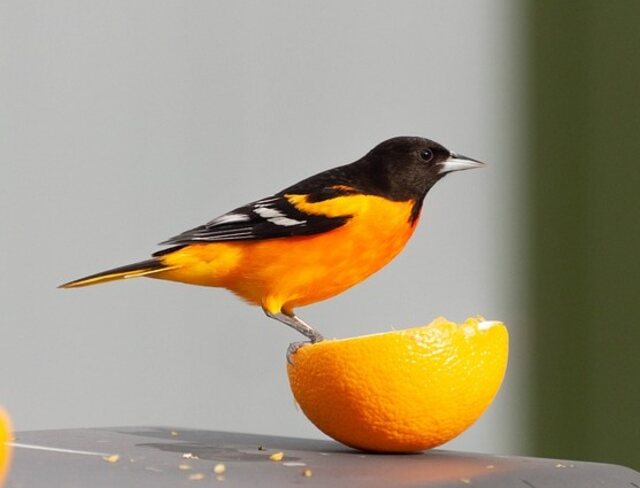
Factors That May Influence Whether Baltimore Orioles Eat Bird Seed
Environment and Habitat
Baltimore Orioles are migratory birds that breed in North America during summers and fly to Central and South America to spend their winters. Their habitats range from woodlands to forest edges, orchards, parks, and residential areas with large trees.
The environment where the birds live has a significant impact on their feeding habits. If there are a lot of natural food sources available, such as nectar-bearing flowers or fruit trees, they may ignore the bird seed offerings altogether.
In contrast, if there is limited access to their usual food sources due to habitat destruction or climate change, then bird seed could become an attractive alternative.
The environment can also influence whether Baltimore Orioles eat bird seed based on the type of vegetation around them.
They prefer eating insects over seeds, but will turn to fruits when insects become scarce.
If there are mostly pine trees around them with fewer deciduous trees such as apple trees that produce fruit, they may be more likely to try birdseed.
Availability of Natural Food Sources
The availability of natural food sources plays a significant role in whether Baltimore Orioles eat bird seed. For example, during spring migration when they arrive at their breeding grounds in North America, nectar-bearing flowers may not have bloomed yet.
At this time of year, offering sugar water can help sustain them until nectar plants become available.
In addition to seasonal changes in natural food availability affecting behavior towards birdseed consumption, human modification of environments forces many species including Baltimore Orioles to adjust their feeding habits significantly.
Ornamental grasses and non-native plant species offer little food options for native birds, so supplementing with high-quality birdseed could be beneficial.
Other Factors such as Migration Patterns
Bird migration patterns can also impact the consumption of birdseed by Baltimore Orioles. During the spring and fall migration seasons, the Baltimore Orioles are in a state of flux, and their feeding habits can be unpredictable.
They might eat whatever food is available to them on their migratory path, including birdseed that they come across.
Additionally, if they’re flying at high altitudes over areas with limited vegetation, then finding food could be more challenging than usual. At these times, bird seed could help sustain them as they travel.
Migration also influences what kind of bird seed they would prefer to eat, as different areas have different types of seeds available because of varying vegetation present.
For example, during the fall migration season in Maryland, orioles favor sunflower seeds placed in platform feeders instead of tube feeders because it is easier for them to consume before continuing their flight southwards.
Overall, while there are many factors that may influence whether Baltimore Orioles eat bird seed, it’s important to remember that their natural diet consists mostly of nectar and fruit supplemented by insects.
It’s always best to encourage natural food sources such as planting native flowers and trees instead of relying solely on commercial birdseed offerings.
However, providing some birdseed options can help support these beautiful birds when other food options are scarce.
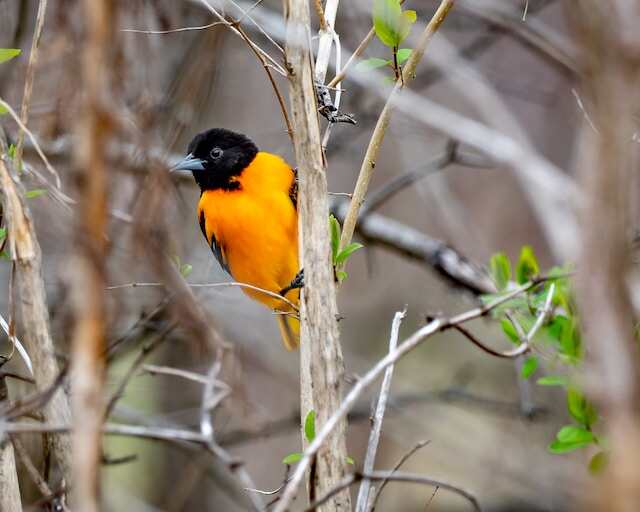
Tips for Attracting Baltimore Orioles to Your Yard
Planting Specific Types of Trees and Flowers That Attract Them
Baltimore Orioles are attracted to certain types of trees and flowers that provide them with natural food sources.
These include fruit-bearing trees such as cherry, plum, and apple trees. They also prefer flowers that produce nectar, such as trumpet vine, bee balm, and cardinal flower.
By planting these in your yard or garden, you can create a natural habitat for Baltimore Orioles.
It’s important to note that it may take a few years for the trees and flowers to mature enough to produce fruit or nectar.
Offering Nectar Feeders and Fruit Feeders
In addition to planting specific types of trees and flowers, offering nectar feeders and fruit feeders is another way to attract Baltimore Orioles. Nectar feeders can be purchased at most pet stores or online retailers.
To fill the feeder, mix one part white granulated sugar with four parts water to make a solution. Fruit feeders can also be purchased or created at home using halved oranges or grapefruits placed on a platform feeder.
When offering nectar or fruit feeders, it’s important to keep them clean and filled with fresh food daily. This will help attract more Baltimore Orioles along with other birds who enjoy these types of foods.
Providing Fresh Water
Baltimore Orioles also require access to fresh water for drinking and bathing purposes. A birdbath or shallow dish filled with water should be placed near their feeding areas but away from any potential predators like cats.
It’s important to change the water in the birdbath regularly (at least every 2–3 days) as stagnant water can become a breeding ground for bacteria which can harm birds.
Creating an Ideal Habitat for Baltimore Orioles
Attracting Baltimore Orioles to your yard involves creating an ideal habitat for them that provides natural food sources, fresh water, and shelter.
By planting specific types of trees and flowers that they prefer, offering nectar and fruit feeders, and providing fresh water in a birdbath or shallow dish, you can create an attractive environment for these beautiful birds.
It’s important to remember that attracting Baltimore Orioles may require some patience, as it can take time for them to discover your offerings.
Be persistent with your efforts, and soon enough you’ll have a thriving habitat that will attract these stunning birds along with other species of birds.
Conclusion
After examining the dietary habits of Baltimore Orioles, it is clear that they do not commonly consume bird seed. While it is possible for them to eat bird seed, this is not a natural or common food option for these birds.
Orioles typically feed on nectar, fruit, and insects, with occasional additions such as jelly or mealworms. Factors such as environment and habitat play a significant role in the availability of natural food sources for Baltimore Orioles.
As migratory birds, their diet may also change depending on location and time of year. However, it is still important to provide suitable food options for these beautiful birds.
If you are interested in attracting Baltimore Orioles to your yard, there are several steps you can take. Planting specific types of trees and flowers that attract them can be very helpful.
Additionally, offering nectar feeders and fruit feeders will provide a great source of nutrition for these birds. Don’t forget to provide fresh water as well!
It’s important to remember that while we may enjoy watching birds at our bird feeders, we should also be mindful of providing them with appropriate food options that mimic their natural diet as closely as possible.
This not only benefits the health and well-being of these beautiful creatures, but also helps promote a healthier ecosystem overall.
While Baltimore Orioles have been known to occasionally eat bird seed such as black oil sunflower seeds when other food options are scarce or unavailable; a diet consisting mostly of nectar, fruits and insects are more suited to their natural dietary requirements.
By offering suitable alternatives such as nectar and fruit feeders along with proper water sources in our yards; we can attract these brilliant birds without disrupting their natural diets too much!
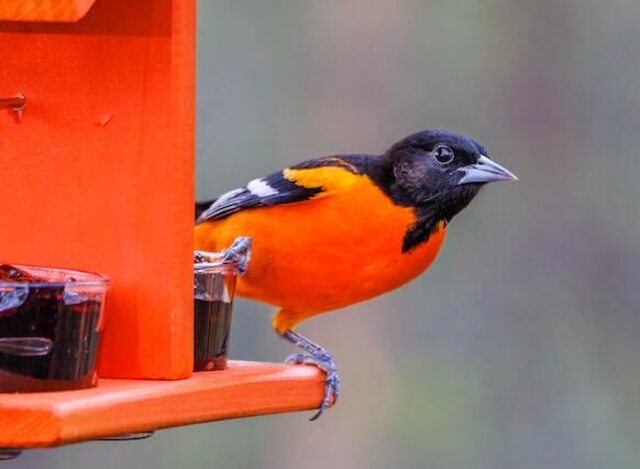
FAQs: Do Baltimore Orioles Eat Bird Seed?
Do Baltimore Orioles eat bird seed?
Yes, Baltimore Orioles can eat bird seed, but they primarily feed on insects, fruit, and nectar.
What kind of seed do Baltimore Orioles like?
Baltimore Orioles are not typically attracted to common birdseed mixes, but they may consume mealworms or offer oranges and grape jelly on special feeders.
Does offering birdseed attract orioles?
Offering birdseed may not attract Baltimore Orioles to your feeder as they prefer insects, fruits, and nectar, but offering mealworms or fruit jelly may help.
Can Baltimore Orioles eat dried fruit?
Baltimore Orioles may consume dried fruit, especially raisins or currants, but fresh fruit is always preferred.
What should I do if I want to attract Baltimore Orioles to my backyard?
To attract Baltimore Orioles to your backyard, provide a range of foods including mealworms, fruit jelly, fresh fruit, and nectar in specialized feeders.
Are Baltimore Orioles migratory birds?
Baltimore Orioles are known as migratory birds that breed primarily in North America during summers and fly to Central and South America for the winter season.
What other types of food do Baltimore Orioles eat?
In addition to insects, fruits, and nectar, Baltimore Orioles also consume spiders, caterpillars, and other small prey.
Are orioles attracted to hummingbird feeders?
Yes, orioles can be attracted to hummingbird feeders that contain nectar, but it is important to provide them with their own specialized feeders as well.
How often should I change the birdseed in my oriole feeder?
You should change the birdseed in your oriole feeder every few days or as soon as it becomes moldy or contaminated to prevent the spread of disease.
What types of oriole feeders are available?
There are several types of oriole feeders available, including fruit jelly feeders, nectar feeders, and mealworm feeders, to provide a variety of food options for the birds.

